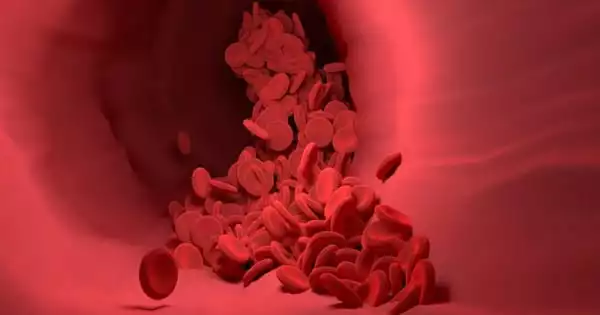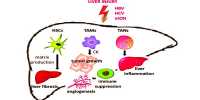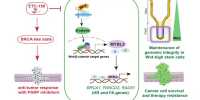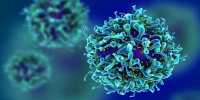According to a new study done by scientists at Van Andel Institute and Pine Rest Christian Mental Health Services, signs of inflammation in the blood reliably predict and detect severe depression in pregnancy.
Perinatal depression is an understudied and undervalued mood disease, but a group of Michigan researchers is pushing the field forward by discovering predictive biomarkers of the condition that could one day be used for regular screening of high-risk women. According to Lena Brundin, M.D., Ph.D., a behavioral medicine professor at the Van Andel Institute and a senior author on the study, nearly one in five new mothers experience severe depression and an estimated 14 percent have suicidal thoughts—and pregnancy, as a major inflammatory event, can be the inducer.
The research team discovered a combination of 15 biological markers detected in the blood that can predict whether pregnant women will have substantial depressive symptoms with 83 percent accuracy. The findings may provide physicians with a much-needed tool for identifying women at risk for depression and better tailoring their care throughout pregnancy.
Approximately one in every five new mothers suffers from severe depression during or after pregnancy, with an estimated 14% having suicide thoughts. Pregnancy is a big inflammatory event, which might exacerbate depression symptoms.
Our findings are an exciting advancement and a crucial first step in using these types of technologies to benefit patients more widely. Our next step will be to replicate the results in additional patient samples to validate depression risk cut-offs.
Lena Brundin
According to a new study done by specialists from the Van Andel Institute and Pine Rest Christian Mental Health, a blood test can indicate whether a woman would have severe depression during her pregnancy. According to a VAI news release, the study discovered that indicators of inflammation in the blood can predict and detect depression symptoms in pregnancy. Scientists discovered a combination of 15 biological blood indicators that can accurately predict severe depression in pregnant women with an 83 percent accuracy.
“Depression isn’t simply something that happens in the brain; its fingerprints are everywhere in the body, including our blood,” said Lena Brundin, M.D., Ph.D., a VAI professor and study co-senior author. “Predicting pregnancy-related depression and its severity will be a game changer in protecting the health of mothers and their infants. Our findings represent a significant step forward toward this goal.”
The study, which was published in Translational Psychiatry, was one of the first of its kind, and it tracked 114 participants from Spectrum Health’s Obstetrics and Gynecology Clinics throughout their pregnancies. In each trimester and postpartum period, participants supplied blood samples and received clinical evaluations for depressed symptoms.

“Having an objective and easily accessible method associated with depression risk, such as a blood test, provides a unique tool for helping identify women who may develop depression during pregnancy,” said Eric Achtyes, M.D., M.S., Pine Rest staff psychiatrist, associate professor at Michigan State University, and study co-senior author. “Our findings are an exciting advancement and a crucial first step in using these types of technologies to benefit patients more extensively. Our next step will be to replicate the results in additional patient samples to validate depression risk cut-offs.”
According to the news release, about one in every five new mothers suffers from severe depression during or after pregnancy, and an estimated 14% have suicidal thoughts. According to specialists, inflammation can increase depression symptoms, and pregnancy is a huge inflammatory event. According to the release, the findings of the new study will assist clinicians identify women who may be at risk for depression during pregnancy so that they may better tailor their care.
In a statement, Pine Rest staff psychiatrist Dr. Eric Achtyes, an associate professor at Michigan State University and co-senior author of the study, said, “Having an objective and easily accessible method associated with depression risk, such as a blood test, provides a unique tool for helping identify women who may develop depression during pregnancy.”
“Our findings are an exciting advancement and a crucial first step in using these types of technologies to benefit patients more widely. Our next step will be to replicate the results in additional patient samples to validate depression risk cut-offs.”
The new study was published in the peer-reviewed medical journal Translational Psychiatry. 114 volunteers from Spectrum Health’s Obstetrics and Gynecology Clinics were monitored throughout their pregnancies by scientists. According to the announcement, participants supplied blood samples and underwent clinical evaluations for depressed symptoms during each trimester and postpartum period.














